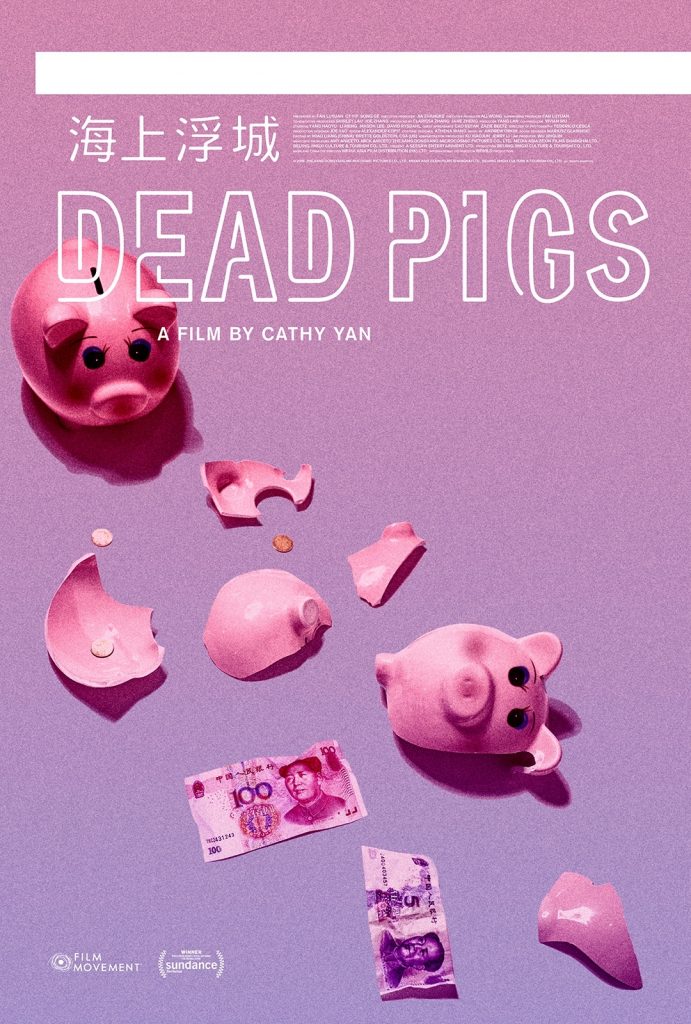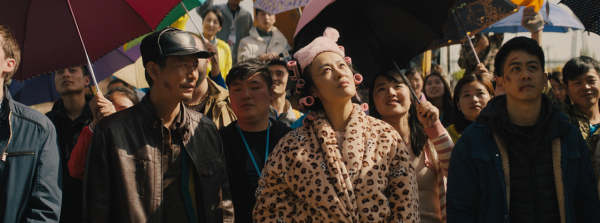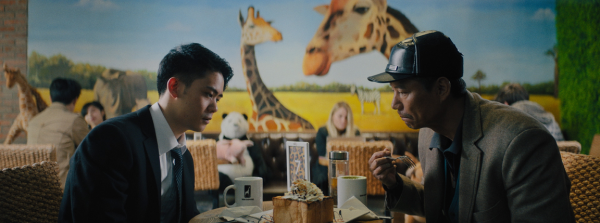‘Dead Pigs’ connects the dots of daily living

“Dead Pigs” (2018 production, 2021 release). Cast: Vivian Wu, Haoyu Yang, Mason Lee, Meng Li, David Rysdahl, Zazie Beetz, Cao Kefan. Director: Cathy Yan. Screenplay: Cathy Yan. Web site. Trailer.
There’s more that binds us than meets the eye, and the strings that connect us may take some surprisingly unexpected forms. It may not be possible to anticipate the impact they’ll have, either, but we should nevertheless make an effort to remain conscious about their existence, for the developments that arise from them can be quite striking – and startling. So it is for a collection of seemingly unrelated parties in the recently released fact-based Chinese comedy-drama, “Dead Pigs.”
In 2013 near Shanghai, China, thousands of dead pigs were found mysteriously floating down the Huangpu River, a phenomenon that eventually spread nationwide. The cause? No one knew initially, but the story created a sensation that captivated the public’s attention and dominated the headlines of various news organizations. This strange incident prompted an array of related events, some of them seemingly removed from this enigmatic source, but all of them ultimately tied to the perplexing aquatic swine. And those ancillary tales provide the basis for the interrelated stories in this quirky comedy-drama:
- Pig farmer Old Wang (Haoyu Yang) is feeling quite pleased with himself. He fancies himself part of the “new China,” one who’s eager to get in on the money grab going on throughout the country. Having done well for himself in his farming operations, and with a little money borrowed on the side, he feels confident enough to invest in a new business venture and to go on a spending spree of sorts, purchasing an expensive virtual reality system. However, he soon comes to realize that the investment was a scam, leaving him out of the money, the repayment of which he now owes to shady lenders. And, to make matters worse, like many other farmers, his pigs are now beginning to die. He’s become so destitute that he doesn’t even have the funds to properly dispose the porcine carcasses, so, like many of his peers, he begins dumping them in the river. Unfortunately, he now has “creditors” breathing down his neck, and their collection practices aren’t exactly borrower-friendly.
- Old Wang’s sister, Candy (Vivian Wu), lives in the middle of what appears to be a landfill. She occupies the family home, a property that has been the Wang homestead for three generations and the only building still standing in what was once a thriving residential neighborhood. The reason the structure stands alone is that all of the neighboring buildings have been torn down to make way for a new property development being constructed by the Golden Happiness real estate group. Unlike all of the other homeowners who have vacated the neighborhood, Candy has refused to sell, despite ever-increasing offers from a developer eager to get on with construction. However, that may be about to change as Golden Happiness places increasing pressure on her to leave, a campaign ramped up when the organization contacts Candy’s cash-strapped brother, who apparently has title rights to the property on par with his stubborn sister. Will the siblings be able to reach an amicable agreement?

- Old Wang’s son, Wang Zhen (Mason Lee), has his share of challenges. He works as a busboy at an exclusive club with many demands placed on him. And it’s a job where his attention is distracted by one of the regulars, a beautiful young rich girl, Xia Xia (Meng Li), who is dating (albeit somewhat reluctantly) a wealthy, middle-aged businessman, Liu Jun (Cao Kefan), head of the Golden Happiness group. Xia is quietly smitten with Wang Zhen, too, though their differences in economic and social status make for a tentative involvement, despite the mutual attraction.
- In addition to his romantic issues, Wang Zhen has trouble with his dad. The relationship has always been one-sided, with Old Wang making many demands on his son, particularly financially, a situation that has made Wang Zhen somewhat resentful, despite the obligations he feels compelled to fulfill. Wang Zhen has tried to compensate for this by purposely deceiving Old Wang about his economic status, making himself appear to be far more successful than he actually has been. Of course, now that Old Wang is cash poor, he doesn’t hesitate to ask his allegedly wealthy son for more money, funds that Wang Zhen doesn’t have. To help make up for that deficit, Wang Zhen embarks on a practice of staging phony traffic accidents to extort cash from the unsuspecting drivers. But, despite sending more money to his father, Wang Zhen is in line to become an unwitting target from Old Wang’s lenders, a move aimed at forcing the old man to pay up – and one that increases the tension between dad and his sister.
- The Golden Happiness group is pleased to avail itself of the services of architect Sean Landry (David Rysdahl), an American expat looking to make a name for himself in Chinese real estate. His charismatic nature wins over the locals, helping his star to rise within the organization. This, in turn, helps him catch the eye of Angie (Zazie Beetz), a model groomer who recruits Sean to pose as “an exotic foreigner” at high-profile corporate events, making him even more visible in the Chinese business community. In fact, his employer taps this charisma to aid in negotiations aimed at closing on an important piece of property – the Wang family homestead. Will Sean be able to finally convince Old Wang to transfer the family property – for an extremely lucrative price – that his sister has long refused to sell?

Such are the intertwined storylines that play out as pigs continue to float down the river. How will they be resolved? That depends on how the players live out their respective roles. But one thing is for certain – the connections that unwittingly bind them all can’t be ignored, as they all contribute to the resolution of each scenario.
It’s often quite baffling to see how seemingly disparate events can be connected to one another. People, places and things far removed from one another by qualities like time, distance or relevance shouldn’t be tied to one another – or so it would seem – yet somehow they are, and a number of films in recent years have shown how that’s indeed possible. Consider the examples set in movies like “Grand Canyon” (1991), “Short Cuts” (1993), “Magnolia” (1999), “American Beauty” (1999), “Crash” (2004), “Babel” (2006), “Disconnect” (2012), “Cloud Atlas” (2012) and “Monsters and Men” (2018), and it becomes much easier to see how connections arise and emerge, tying seemingly unrelated elements to one another. Interestingly, in some ways, these films artistically reflect the scientific principle of quantum entanglement, which maintains that removed and seemingly unrelated atomic particles can indeed operate in unison when one might think they probably shouldn’t, a concept Albert Einstein referred to as “spooky action at a distance.” And so it is for how events unfold in “Dead Pigs.”
However, when considered philosophically, this shouldn’t come as a surprise. Many metaphysical doctrines maintain that everything in reality is innately connected, like the threads of a tapestry. Indeed, one can’t pull on one of those strands without all of the others being inherently affected in some way or another. That’s especially true when it comes to the conscious creation process, the philosophy that maintains we manifest the existence we experience through the power of our thoughts, beliefs and intents. And, when those notions become intertwined, connections among them develop, yielding co-creations that have wide-ranging effects. This would thus help to explain how the flotilla of dead pigs wending their way down the Huangpu River can ultimately have effects on a holdout homeowner, a financially destitute farmer and a lovesick busboy seeking to impress his often-disapproving father.

Because of these connections, it’s important for us to recognize how the manifestations associated with them come into being. No matter how much we might like to disassociate ourselves from some of these materializations, they still all originate with us, reaching out from our inner being and into the physical world, where they interact with their fellow manifestations. And understanding this is crucial, for it places an intrinsic responsibility upon each of us to create with accountability and integrity. Should we fail to do so, we end up witnessing the kinds of snafus that appear in this film.
This is especially important where the creations impact our well-being in sensitive areas, such as finances, and it’s true both individually and collectively. In many regards, the various story threads in this picture – which are indeed rooted in fact – illustrate the economics of life in the new China, both on the microcosmic and macrocosmic level. The experiences of the well-to-do and those looking to become part of the well-to-do are represented here, and their illustration through this film reflect what the citizens of the People’s Republic are experiencing. The haves vs. the have-nots may be a well-worn cinematic narrative, yet its persistence in art demonstrates how persistent the template is in real life as well. The disparities are indeed troubling, too, which should prompt us to ask ourselves, why do we keep creating them? If the moral and ethical impact is so upsetting, how can we allow it to continue, even if it’s new to this venue? Why don’t we simply change the beliefs to change the outcomes? And, if we don’t or won’t, what does that say about us?

It’s ironic that this story originates with the death of pigs, too. In Chinese astrology, the pig is the sign associated with wealth and abundance. Yet here the pigs are dying in huge numbers. What does that say symbolically about the ability of the average citizen to live “the Chinese dream”? With so much opportunity seemingly available, one might assume that there’s plenty to go around for everybody, but does the reality really match the aspiration? One might say apparently not, which brings us back to the beliefs we’re collectively putting out there. If we want the aspiration to ring true, the beliefs that make it possible need to be put in place to start with. And, when the cause of the pigs’ deaths is at last revealed, there’s an even greater irony at work here, especially when it comes to the present course of the accumulation and distribution of wealth, not only in China but indeed in the entire capitalist world.
In reaching that point, we must, of course, assess what works and what no longer does. That means making astute decisions about what to hold onto and what to let go of. And that, in turn, means going back and taking another look at the beliefs aimed at manifesting what materializes, both individually and collectively. That may be a tricky process, to be sure, but when one looks at what China has been able to achieve so far in such a short time, there’s a clear will to succeed. Making sure that the process continues as desired, though, may take some more work – efforts that stem from the origins of what’s envisioned in the first place and then following through accordingly.

The delightful narrative of this fact-based comedy-drama is loaded with whimsical twists and turns, hearty belly laughs and just the right amount of understated campiness, combining to make a thoroughly entertaining mix. It also gives viewers much to ponder in terms of fairness, change, and the welfare of both individuals and society at large. Director Cathy Yan’s recently released debut feature admittedly sags at a few points in the second half, but that’s a small price to pay for everything else this charming and quirky picture has to offer.
“Dead Pigs” was well received when it debuted at film festivals in 2018, but it failed to receive a distribution deal until only recently, prompted in large part by the success of director Yan’s subsequent feature, “Birds of Prey” (2020). Fortunately, the film is now available for streaming online.
Life can appear to throw us some pretty odd curves at times, but sometimes they’re necessary to get our attention, particularly when it comes to addressing matters requiring long overdue restitution. We might not like what happens nor what these materializations are attempting to show us, but they are often vital to help us set things to right. We had better hope we’re paying attention, too. If not, we may be saddled with a slurry of deceased swine – and an even bigger mess to clean up.
Copyright © 2021, by Brent Marchant. All rights reserved.



